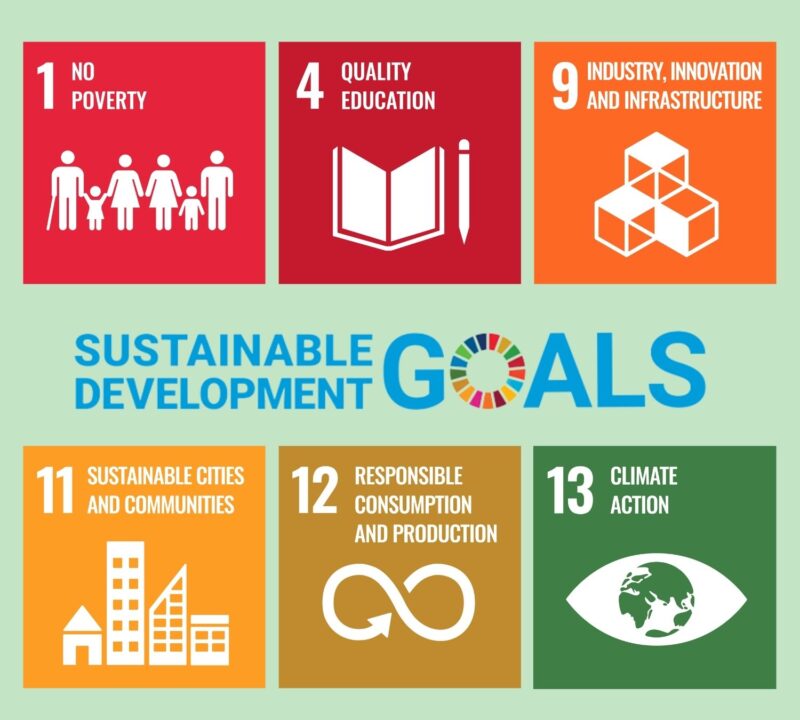In 2015, all 193 member states of the United Nations adopted the Sustainable Development Goals as a blueprint for a better world. From eradicating poverty to building a circular economy, the SDGs pair lofty ideals with specific targets to be achieved by 2030.
Thousands of businesses around the world have aligned their CSR and ESG initiatives with the SDGs. Here’s how working with the Green Standards program is a turnkey and cost-effective way to bolster six of those 17 goals.
SDG 1: End poverty in all its forms everywhere

To eradicate global poverty, the United Nations has set a target to “by 2030 achieve substantial coverage of the poor and vulnerable.”
Since 2011, Green Standards has helped organizations donate more than US$40 million of office furniture, fixtures, and equipment to non-profits. These donations allow food banks, shelters, and community organizations around the world focus their resources on alleviating poverty.
SDG 4: Ensure inclusive and equitable quality education and promote lifelong learning opportunities for all

A key target for this goal highlights the buildings themselves. “Build and upgrade education facilities that are child, disability and gender sensitive and provide safe, non-violent, inclusive and effective learning environments for all.”
Schools are a primary beneficiary of Green Standards’ work around the world. Indeed, more than 1,000 educational institutions have received donations from our clients. On the whole, these desks and chairs have created better learning environments for hundreds of thousands of students and teachers.
SDG 9: Build resilient infrastructure, promote inclusive and sustainable industrialization and foster innovation

A sustainable business becomes more efficient as it grows. To that end, the Industry, Innovation and Infrastructure SDG calls for “increased resource-use efficiency and greater adoption of clean and environmentally sound technologies and industrial processes.” Progress toward this target is measured by CO2 emission per unit of value added.
Green Standards pioneered the field of sustainable decommissioning. That means that we ensure workplace change adds nothing to landfill and supports net-zero waste goals. Our comprehensive reporting empowers clients to report on this efficient use of valuable resources.
SDG 11: Make cities and human settlements inclusive, safe, resilient and sustainable

How do you build a sustainable community? You reduce “adverse per capita environmental impact of cities, including by paying special attention to air quality and municipal and other waste management.”
In the U.S., the EPA estimates that 80% of all office furniture goes to landfill. But proper waste management should keep these items in use for as long as possible. Then, they should be strategically recycled. That’s what the Green Standards platform is designed to do. And that is how we maximize environmental, social, and financial value in major city centers and communities around the world.
SDG 12: Ensure sustainable consumption and production patterns

By 2030, this SDGs target calls on organizations to “substantially reduce waste generation through prevention, reduction, recycling and reuse.” Our disposition strategies prioritize reuse through donation or resale. When necessary, we turn to specialized recycling. This approach virtually eliminates workplace waste.
Sustainability demands scrutiny. That’s why target 12.6 encourages companies to “integrate sustainability information into their reporting cycle.” For this reason, our documentation is compatible with all major entities including GRI, LEED, and GRESB. In addition, many of our Fortune 500 clients cite their results in their annual sustainability reports.
SDG13: Take urgent action to combat climate change and its impacts

The urgency of this goal becomes clearer with every natural disaster, heat record, and IPCC report. A key indicator is “total greenhouse gas emissions per year,” a measure that should eventually include all production. Green Standards reporting uses EPA guidelines to calculate emission reductions that result from keeping furniture out of landfill, underlining the climate implications of every decision we make.
As major companies continue to align their corporate social responsibility initiatives with the UN’s Sustainable Development Goals, we’re proud to offer a proven, cost-effective way to ensure that workplace change is handled in an ethical, efficient, and cost-effective manner.



